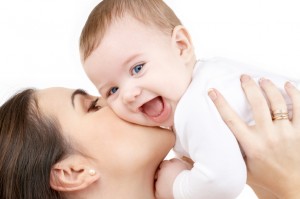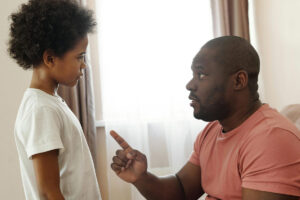What is Your Attachment Style?

What is attachment and why is it important?
Attachment refers the particular way in which you relate to other people. Your style of attachment was formed at the very beginning of your life, during your first two years. Once established, it is a style that stays with you and plays out today in how you relate in intimate relationships and in how you parent your children. Understanding your style of attachment is helpful because it offers you insight into how you felt and developed in your childhood. It also clarifies ways that you are emotionally limited as an adult and what you need to change to improve your close relationships and your relationship with your own children.
Early Attachment Patterns
Young children need to develop a relationship with at least one primary caregiver in order for their social and emotional development to occur normally. Without this attachment, they will suffer serious psychological and social impairment. During the first two years, how the parents or caregivers respond to their infants, particularly during times of distress, establishes the types of patterns of attachment their children form. These patterns will go on to guide the child’s feelings, thoughts and expectations as an adult in future relationships.
Secure Attachment:
Ideally, from the time infants are six months to two years of age, they form an emotional attachment to an adult who is attuned to them, that is, who is sensitive and responsive in their interactions with them. It is vital that this attachment figure remain a consistent caregiver throughout this period in a child’s life. During the second year, children begin to use the adult as a secure base from which to explore the world and become more independent. A child in this type of relationship is securely attached. Dr. Dan Siegel emphasizes that in order for a child to feel securely attached to their parents or care-givers, the child must feel safe, seen and soothed.
Avoidant Attachment:
There are adults who are emotionally unavailable and, as a result, they are insensitive to and unaware of the needs of their children. They have little or no response when a child is hurting or distressed. These parents discourage crying and encourage independence. Often their children quickly develop into “little adults” who take care of themselves. These children pull away from needing anything from anyone else and are self-contained. They have formed an avoidant attachment with a misattuned parent.
Ambivalent/Anxious Attachment:
Some adults are inconsistently attuned to their children. At times their responses are appropriate and nurturing but at other times they are intrusive and insensitive. Children with this kind of parenting are confused and insecure, not knowing what type of treatment to expect. They often feel suspicious and distrustful of their parent but at the same time they act clingy and desperate. These children have an ambivalent/anxious attachment with their unpredictable parent.
Disorganized Attachment:
When a parent or caregiver is abusive to a child, the child experiences the physical and emotional cruelty and frightening behavior as being life-threatening. This child is caught in a terrible dilemma: her survival instincts are telling her to flee to safety but safety is the very person who is terrifying her. The attachment figure is the source of the child’s distress. In these situations, children typically disassociate from their selves. They detach from what is happening to them and what they are experiencing is blocked from their consciousness. Children in this conflicted state have disorganized attachments with their fearsome parental figures.
Read More about Identifying Your Child’s Attachment Style
Adult Attachment Styles
Secure Personality:
People who formed secure attachments in childhood have secure attachment patterns in adulthood. They have a strong sense of themselves and they desire close associations with others. They basically have a positive view of themselves, their partners and their relationships. Their lives are balanced: they are both secure in their independence and in their close relationships.
Dismissive Personality:
Those who had avoidant attachments in childhood most likely have dismissive attachment patterns as adults. These people tend to be loners; they regard relationships and emotions as being relatively unimportant. They are cerebral and suppress their feelings. Their typical response to conflict and stressful situations is to avoid them by distancing themselves. These people’s lives are not balanced: they are inward and isolated, and emotionally removed from themselves and others.
Preoccupied Personality:
Children who have an ambivalent/anxious attachment often grow up to have preoccupied attachment patterns. As adults, they are self-critical and insecure. They seek approval and reassurance from others, yet this never relieves their self-doubt. In their relationships, deep-seated feelings that they are going to be rejected make them worried and not trusting. This drives them to act clingy and overly dependent with their partner. These people’s lives are not balanced: their insecurity leaves them turned against themselves and emotionally desperate in their relationships.
Fearful-Avoidant Personality:
People who grew up with disorganized attachments often develop fearful-avoidant patterns of attachment. Since, as children, they detached from their feelings during times of trauma, as adults, they continue to be somewhat detached from themselves. They desire relationships and are comfortable in them until they develop emotionally close. At this point, the feelings that were repressed in childhood begin to resurface and, with no awareness of them being from the past, they are experienced in the present. The person is no longer in life today but rather, is suddenly re-living an old trauma. These people’s lives are not balanced: they do not have a coherent sense of themselves nor do they have a clear connection with others.
Developing an “Earned Secure Attachment”
The good news is, it’s never too late to develop a secure attachment! Although your patterns of attachment were formed in infancy and can follow you throughout your life, it is possible to develop an “Earned Secure Attachment”at any age.
One essential way to do this is by making sense of your story. According to Dr. Dan Siegel, attachment research demonstrates that “the best predictor of a child’s security of attachment is not what happened to his parents as children, but rather how his parents made sense of those childhood experiences.” The key to “making sense” of your life experiences is to write a coherent narrative, which helps you understand how your childhood experiences are still affecting you in your life today. In PsychAlive’s online course with Drs. Dan Siegel and Lisa Firestone, they will walk you through the process of creating a coherent narrative to help you to build healthier, more secure attachments and strengthen your own personal sense of emotional resilience.When you create a coherent narrative, you actually rewire your brain to cultivate more security within yourself and your relationships.

In this Webinar: This online workshop with Dr. Lisa Firestone will provide tools to help people heal insecure attachment, resolve trauma, integrate their…
Because our attachment ability is broken in a relationship, it is often best to be fixed in a relationship. According to Dr. Lisa Firestone, “One of the proven ways to change our attachment style is by forming an attachment with someone who had a more secure attachment style than what we’ve experienced. We can also talk to a therapist, as the therapeutic relationship can help create a more secure attachment. We can continue to get to know ourselves through understanding our past experiences, allowing ourselves to make sense and feel the full pain of our stories, then moving forward as separate, differentiated adults. In doing this, we move through the world with an internal sense of security that helps us better withstand the natural hurts that life can bring.”
To learn more about how to write a coherent narrative and develop an earned secure attachment, join Dr. Lisa Firestone and Dr. Daniel Siegel for the online course “Making Sense of Your Life: Understanding Your Past to Liberate Your Present and Empower Your Future.”











Thank you for posting this article, it was very helpful
I like that you are puting information out there about understanding yourself from the perspective of attachment style. It would be even more helpful if you added a suggestion or two for each adult attachment style about what to do to improve relationships and to move more toward a secure attachment with intimate others!
Thank you for this page!!!
I have a boyfriend who exhibits Fearful-Avoidant Personality. His dad died at an early age and has carried this grief with him. every time he opens up to me he disappears for a few days and comes back. He avoids serious conversations, he always needs time to think before making a decision about our relationship. he puts me on an emotional roller coaster. As soon as he feels close to me he runs away and re-appears a few days later.
It’s possible the roller-coaster you are experiencing is due to your own attachment issues, or addictive codependent tendencies. If you were secure, or at least securely attached in relation to your relationship to him, you would not be on a roller-coaster. Securely attached, non-codependent, people don’t ride the coaster – regardless of what their partner is doing. Sometimes it’s just a particular partner that strikes these addictive and unhealthy feelings of “love” in us. My advice is to find a man with a better energy. He should feel slightly different than you are used to (maybe you’re not sure if he is even ‘your type’), and he should be an unwavering source of steady Love. Around him, with him behind you supporting you, you should feel extremely secure, safe, calm, and unconditionally loved. THAT is what you need as an independent woman who wants to develope herself; a steady support and source of love to blossom with. The love of a good man. … You are responsible for your emotions. He does not get to decide if you’re on a roller coaster. No matter what. With some perspective you would see that. Since you already understand what he is doing, if you want to stick with him, it should not be an emotional thing, but rather something you can calmly observe from a detached place. If you can’t maintain that kind of objectivity it’s likely not truly love, but an codependent addiction, which tells you the place You are in. I highly recommend InnerBonding. Also, drlwilson.com has a number of articles about man/woman relationships that are excellent. Good Luck to you.
Thank you for this article and the videos – both are incredibly useful. Is Video #3 of the 6 missing? Can you please fix it.
I’m preparing for a 6 week EFT (Emotional Freedom Technique) course on reprogramming the primitive brain. As I contemplate my issues with relationships and social interactions, I found myself needing to look at attachment theory again. My past research online was disappointing, so I really appreciate finding this article today. Now I’m googling disorganized attachment and finding more and more.
Does this kind of “good man” exists? Or doesn’t all/most of the Charming Prince turn out to be less charmingwith time?
How interesting that I have a secure personality but my childhood was anything but. I never formed relationships with caregivers and I will never truly understand a mother daughter relationship. I think everything is a choice. We can choose to be affected by our past or we can keep going and learn how to form healthy relationships and bonds.
The way to learn more about your own attachment style and to get help with your relationships is to seek out a group or individual therapist who understands attachment, so anyone trained psychoanalytically.
Best start with yourself, likely the only way to stop attracting the bad men.
That sounds very much like a comment from an avoidant type, pardon me saying, self sufficient, no need to depend on anyone, can do it myself. All about choice. Sadly, that just ain’t true. Doesn’t mean you can’t have good relationships, or learn as you say, but a great deal is unconscious and unless you get that, it can be very difficult to get help because you may just keep turning to self help books when what is needed is reparative relationships, therapeutic or otherwise.
I did the test, came out as preoccupied. But I can see some of the fearful-avoidant personality in the way I was raised. My father has a narcissistic personality that made me experience physical and emotional cruelty several times. I learned about all these during two years of therapy after a really bad divorce, therapy that I continue currently because I want to change and improve. And there is my question, can we change? what else can I do to supercharge my change? sometimes I feel therapy is just talk and talk and talk but that I could be doing more in my own time (like reading your page, etc) to make changes faster. self sabotage is a big obstacle to overcome for me, any advice on that too? Thanks a lot for your information, great videos, very informative and clear. Thanks!
We have a free Webinar on attachment with Dr. Lisa Firestone in June, Is Your Attachment Style Shaping Your Life?, you are welcome to sign up to learn more about how you can change your attachment style and improve your life.
What a superb article. I am fully preoccupied anxious as my attachment however my boyfriend is totally dismissive personality. He keeps all of his thoughts and feelings and emotions locked up. It’s like he has a brick wall around himself that I am endlessly trying to break down. He doesn’t feel the need for ‘touchy/feely’ with me e.g holding hands, random kiss for me, telling me I look good etc. He is so laid back it’s impossible. When I ask him a question, even as simple as ‘are you hungry’ I get the same two answers…don’t know, whatever. It’s destroying me because he just doesn’t fulfil any of my needs apart from care for me when I’m ill with my epilepsy. Even then he’s really laid back about it and can’t seem to understand anything about me or want to know. This happened since the relationship got serious. Not in the first honey moon period. I am working with a therapist but he drives me crazy everyday with his total lack of priorities and affection.
How do I get through to him?? I love him and know he loves me but just doesn’t show it in any way at all.
What I see in myself are very different attachment styles depending on my partner. I’ve had very secure relationships, ones in which I distanced myself, and others where I felt insecure.
So I have no idea in which category I fall!
No idea which category I’m in. Either preoccupied or fearful-avoidant. I tend to be internally clingy without being too externally clingy (i.e. I can tell I’m being irrational so I don’t mention it), although sometimes I can be externally clingy as well.
But…when I’m stressed I don’t usually get emotional, I zone out and dissociate. There have been times recently where I get emotional instead, as I have learned through therapy to identify my emotions (I was dissociated from them originally so couldn’t tell you what I felt). In the past, when there has been conflict in a relationship – or even just internal conflict where I want to leave the partner but am unable to – I have passed out or become severely derealised/dissociated. Generally, I become physically unwell and numb. There has been one break-up where I have acted in a typical preoccupied way.
I think I may have originally been fearfully-anxious but after therapy and learning some assertiveness and some confidence, and the ability to experience emotion, have become more preoccupied. I think this might actually be progress!
If it helps anyone else, what I’m doing is mindfulness training and learning self-soothing techniques. The mindfulness helps me to be aware of what I’m feeling as I’m feeling it so that my emotions don’t come as a shock to me when they get to a distressing level, and the self-soothing techniques are ways for me to manage my emotions in a helpful way (taking baths, hugging hot water bottles, that kind of thing).
It’s helpful as well to remind yourself of boundaries – so that’s noticing if you feel that ‘they are making you emotional’ – they are not making you emotional, you are experiencing emotion dependent on their actions, which is a problem. There are always boundaries between you and others. Other people don’t cause you to feel a particular way, it is completely internal. Do not attempt to reassure yourself and never seek reassurance from others. It is better to think about what the fear is – generally loss/abandonment – and then try to consider why you fear it (Do you think you will not find another partner? Do you think the loss reflects on you? Do you feel you cannot cope with loss?) Working on that within yourself is a better solution. And if you feel extremely uncomfortable in a relationship, it may be better to leave in order to work on these things alone as it will be difficult for you to enjoy the relationship and eventually difficult for them to enjoy it too.
I think you should leave him and find someone else to love. You cannot change another person, they have to want to change themselves. He doesn’t want to change. It will be empowering for you to leave and find someone new and it will increase your self esteem. Seriously. Do it. Life changer.
welcome m8
Well, I am encouraged because I tested out as preoccupied which means I have learned some things. Very abusive parents raised me. One my father was a full fledge pedophile and my mother was totally shut down. I got out of a marriage that was not much different by counseling, Al-non, and sexual abuse therapy. I have been getting to know someone for the last year but we have not decided yet exactly where this is going. I do know that emotionally things are getting deeper but I have not asked for any real commitment however, that is starting to come. If he feels the same, I fully believe most of my fears will fade away. I am aware of his childhood upbringing and can wait for some things until he is more secure which seems to be happening by the things he is saying. Time will of course tell but I continue to do research and practice to become all that I can be even if I take two steps backward I still go forward a step. I continue to be opening up even to other women so I am hopeful that I will get to the secure relationship soon.
I always come out as secure in these tests but I’m not because I’m a very insecure person. It’s partly because I’m not sure about how to answer the questions, though, it doesn’t seem clear-cut to me. When asked if I want to be very close to my partner I just feel unsure – yeah, I guess? Probably? It doesn’t seem like I have a strong feeling about it. I also find it quite difficult to remember my relationships.
Also, looking at the child ones, I recognise my child self in all of the insecure styles. “Little adult” would describe me well, it was commented upon, and I always wanted to do things by myself and do the most challenging work as I found it exciting. I wasn’t particularly interested in most other children. I also didn’t suffer from separation anxiety, although my brother did, and I never understood the meaning of homesick – I’ve never missed any member of my family or had strong feelings for them, not as a kid or now, and I basically don’t speak to my Dad but I kind of forget he exists if I’m honest.
I used to tell therapists I had a perfect childhood and couldn’t understand why I was so fucked up, but after quite a lot of therapy and chats with my brother about things I have no memory of whatsoever (although he swears they happened), it would seem that my parents could actually be quite cruel sometimes. Dad was just cold and indifferent – and actually I remember him being very critical. I didn’t like having to hug or kiss him goodnight because it felt weird and inappropriate, but sometimes my mother would tell me to do it. But then with my mother, I can remember wanting to hold her hand a lot and wanting to do things for her and wanting to impress her all the time. I also annoyed my family quite a bit because I was never ‘with it’, I was always fantasising. I didn’t react when I was attacked either. Or it would take a very long time and a lot of prodding before I would finally just lose it completely and violently lash out (I mean, it would take days…months…)
So….dismissive sometimes, clingy sometimes, dissociative other times? (That would explain the memory loss of negative events that sound quite significant…and the fact I thought I had a perfect childhood?)
As an adult, I fit both the preoccupied and fearful avoidant descriptions, but my reaction from memory when I’ve felt ‘in danger’ (of rejection) around a man is that I’ve felt initially a desire to approach and seek reassurance, and if this is not received or if they are cold towards me I experienced a desire to flee in order to protect myself – a desire to emotionally distance myself usually, though. When me and my ex were splitting up, I continued hanging around with him, but I couldn’t sleep in the same bed as him because I found it too painful to be close to him when I knew he was leaving (this was decided at this point, he was moving away and we had agreed to split up when he did, it wasn’t just in my head that he was leaving). I took the breakup very hard and was inconsolable afterwards, and found it difficult to separate myself even though I kept trying to draw a line under it. I think at first I wanted us to get back together, but then I didn’t want us to get back together because I knew it wouldn’t be the same anyway and still couldn’t get over it all despite that! This must have seemed very confusing and inconsistent to him…But then I had therapy afterwards and looking back I’m not sure I ever even talked about it much…I just wanted to talk about my career…also I recognise myself in the incoherent narrative bit if this is what it means, because I find my history incoherent. It feels like my life is all blocked up into different chunks that don’t fit together so sometimes I feel like I don’t really have a history at all and I’m just freefalling through chaos. Despite saying all of that, I’m not THAT fucked up nowadays. I’m pretty successful and I’ve never had difficulty maintaining good relationships with friends – we get on well – rarely argue with anyone, am not emotionally reactive 99% of the time, and if it weren’t for the so-far annual nervous breakdowns no one would know anything was wrong. Psychology is confusing. Presumably you can have little bits of different styles? Not everyone can fit in four boxes, right?
I know exactly how you feel, im going through the same thing. Everything you just said…is exactly how my boyfriend is.
Dear Anonymous,
I am not sure what to believe. I am a very happy person when I am single, but I also very easily fall in love and bond with partners. I result as a Secure style in almost all testings with excellent self esteem and balanced altruism. On the other hand, my wife (mother of our 2 children) seems very dependent, ambivalent (or codependent) and YES, I am experiencing a roller coaster. Since she’s very reluctant to seek help from psychologists (I am a professional psychologist, thus she’s aware of the possibilities and can easily get in contact with my colleagues, have contacts, recommendations from people we know…) this is a serious problem for me and I am a little worried about our kids also (the girl is displaying some patterns of behavior similar to her mom). Yes I do love her (and I am quite convinced she loves me, no issues about it), but it is quite a hard life to live… I agree with you on a logical level (I would say the same – your roller coaster is yours – not hers!), but after years of therapy, several testings, feedback from others, and several experiences of other longer relationships in which things were happening in a different manner (does not seem to be a relational cliche’, a script in my case), I don’t know what and where to look for solutions. I mean I would be glad to know that I am something (anxious, controlling, etc…) because this might provide me with the good path to follow myself without waiting for her to take steps (after 12 yrs of relationship I doubt she will). Could you or anybody give me some hints?
7-18-16
To Whom It May Concern,
Can it tell me what my attachment style is? And how to deal with it?
Signed,
Keith P.Cooper
this article is garbage, the video especially, the mere mention of mirror neurons as sponges (long discredited theory in Macaques) renders the whole premise of attachment styles causing attachment styles, well garbage.
That’s not entirely accurate. While interviewed secure-avoidant couples report no significant difference in satisfaction from secure-secure couples, from my reading it is possible for a secure person to become anxious with an avoidant partner. Perhaps this happens by chance, the avoidant just happened to have behaviors hat just happen to press the particular secure’s buttons. Anecdotally it appears that highly avoidant people may cause secure’s, or possibly anxious leaning secure’s, to exhibit anxious behaviors. I’ve even read somewhere that two anxious people or two avoidant people can cause one of the individuals to take on the opposite role and get in the anxious-avoidant trap.
I would recommend this person consider leaving the relationship or addressing her own feelings to try and be less anxious, but to suggest she is not secure simply because she is experiencing anxious thoughts and behaviors is, in my opinion, inappropriate.
I am glad I came across this article. I know that I have some sort of attachment issue but I’m not sure which. I have really been trying to work on myself after noticing some harmful tendencies.
I’m in a relationship, and I know we love each other. We talk constantly, and freely about our feelings and intention in our relationship, which I’m definitely grateful for.
However, when we have issues I feel so insecure. I pull away, so I can feel independant from him and I guess the relationship? I just become nonchalant, almost like he doesn’t deserve my attention/love. In my mind I rationalize and say “he is not communicating, so why should I work towards resolving this problem?”
We always talk about these incidents within a day or two, and discuss future solutions and what went wrong, we understand each other well.
I just can’t get over this feeling of jealousy at times. When he doesn’t call, in my mind he’s busy doing better things or someone else is getting his attention. So when he calls I can’t get passed the anger I feel, so I’m dismissive and quiet.
I know that depression and other things run in my family, so when I get sad I know why. But when it comes to my boyfriend, he can make me very happy or the exact opposite. The opposite can cause me to have almost uncontrollable anger, sadness, I can get verbally abusive at times, even controlling. Which is so upsetting (after the fact) that I can be so cold, hurtful to him.
Any thoughts?
This isn’t really helpful to me. I have parents who met my emotional needs. I felt lucky growing up because my parents stayed together and tried to bring out the best of me without pressuring me. However, I did have a lot of role models aside from my parents who were toxic. Does it necessarily need to be a parent who sows the seeds of bad relationships or could it be something else? I was also molested by an older half brother as a child. I’m wondering if that trauma could relate to my relationship problems.
Christopher, we are all complex beings. Research suggests that our attachment models develop from our initial ‘attachment relationships’, ie our relationships with our parent figures, whoever they are/were. Most often they are our biological parents, but there’s a wide range of human relationships, and I’ve seen cases where ‘other’ relationships can impact on a child quite differently from his/her relationship with his/her primary caregivers. (I should add – mostly in a positive sense, where the primary relationships weren’t so great, but were somewhat ameliorated by other more positive ones.)
You don’t say too much so it’s hard to tell, but maybe you began with a relatively secure attachment, or maybe you have yet to become fully aware of the deficits in the parenting you received. Either way, being sexually abused is a deeply disturbing and damaging experience, and can leave a child who is otherwise secure, in a very confused and injured state. I’m not aware of any research specifically about the differential impacts of sexual abuse on children with different attachment styles, except that we know children with insecure styles are more at risk of abuse for a lot of reasons, but that doesn’t mean secure kids are never abused. It makes sense to think that that trauma relates to your relationship problems, and the way it relates is probably mostly unconscious. You may have ‘irrational’ reactions to aspects of intimacy, such as sex, touch, physical and/or emotional closeness… (I say ‘irrational’ in commas because these things are usually quite rational when we know the full intrapersonal context.)
You could try one of the attachment style questionnaires, such as here: http://www.web-research-design.net/cgi-bin/crq/crq.pl, or just keep reading. But overall I agree with other comments above, that when we have been injured within significant relationships and have developed an insecure attachment style, movement toward a secure attachment can usually only occur within a very good relationship, with someone more secure than yourself. This can be a partner, a very close friend, a therapist, even a mentor sometimes… but it must be someone with whom you can feel emotionally safe and loved.
On the other hand if trauma is the issue, try some specific trauma-focused therapy such as EMDR, tapping, TAT – all of which interrupt the brain’s ordinary neural pathways, eg the ones that lead from a certain type of touch to an ‘irrational’ feeling of ‘I’m not safe’. I’ve personally both experienced and observed that these pathways really can change, allowing these reactions to subside and more natural, positive ones to grow in their place. (And these therapies can also be useful in addressing insecure attachment.) Good luck!
My daughter in law is extremely attached to het Mom and sisters and vice versa. Almost sll of them has daughters of their own and one boy which is our grabdson. They tend to shut the men out when they have activites or functions, eventhough they are invited. They are always the centre of attention and even look alike at all times. If the one has dark hair, the others volour their hair. My husband suggested that they have some type of syndrome because of this attachment they gave wuth each other. My daughter in law is also very possessive of our grand daughter and we don’t really spent time with her. Our grabd daughter doesn’t come to us when they visut, onliy suts with het mom or dad. She is now 2 years old and stays with my daughter in law’s sisters husbands mother during the day. We are very concerend as our grandson 5 years seems to not get enogh attention first of all but are very attention seeking at all times. Fights with children in his class and can’t sit still or participate in class activities.
What can we do? They are slreafy cross because my husband mentioned that they seem to have dome type of syndrome.
thanks for sharing this article
can I know who wrote this article and when? ^_^
This article was written by Lisa Firestone. It was originally published in July 2010, updated in June 2017.
This article and info has been eye opening for me in understanding myself and my husband. The behavior all makes sense now…and I thought I was going bar ? crazy
Kindly mention references and writer’s information. Thank you
I really enjoyed this article, it was very informative and real in my life. I plan to take the two-part workshop to see where it leads me.
Thank you for posting this article I will share this with my adult children.
Brenda Tindal
Hi. I am a 46 yo male. My fiance is 43 yo. She has 3 kids (6,8,13). Both of us have been married once prior. We have been together 4 1/2 years and engaged 2 1/2. We do not live together. We were planning on getting married this summer. I am so very confused and heartbroken. We broke up this past weekend. Based on my relationship with her, I am so lost as to if I am a Secure or Anxious. And is she a Secure or Avoidant/Dismissive? Here has been the typical scenario over 2 years now. She and I can be firing on all cylinders with communication and spending wonderful, appropriate time together for days or weeks, while allowing and being ok with time apart. The problem lies in (who is far more independent and introverted by nature than I – I being more extroverted) when she, without telling me anything on what may be precipitating it, almost overnight goes into a super quiet and border line avoidant personality with me and it can last 3-5 days! She tells me that this is her nature and not unhealthy whatsoever for her. It begins to cripple me after not hearing her voice after 2-3 days. We only live 3 miles apart. She becomes defensive and cold-shouldered when I inquire with her. She tell me “are you insecure in our relationship or not getting enough affirmation?” Then just like that, we are on cloud 9 the next day and it lasts for days or weeks. We have never in 2 years gone more than 2 months without one of these episodes recurring. What happens in my mind during these times of strange (to me) separations is that I start to ponder why she can’t/or chooses not to, display a consistent expression of wanting/needing me in her life. We go literally from the best vacation ever and then I might receive one text message a day (and I have to instigate) if I am lucky. She became so frustrated with me (apparently so, after going 5 days with no communication coming from her except a “thanks” when I told her I loved her in a text) and it was obvious. I finally asked her “where/how do you see me fitting into your life, for life” and her response was “I don’t know”. I then exploded inside and said, “well, then perhaps we should not be together anymore”, and she replied in 0.0008 seconds “Ok”. That was it. Over the phone breakup. 4 1/2 years. I don’t want to breakup, I just lost it on the phone after her response, which I am imagining was a knee-jerk response. And here we are. What do I do? I know it’s time to back off and giver her space. However, I am just wondering if I am absolutely off my rocker to expect that my fiance should not think that one text/day or no communication whatsoever for 3+ days is healthy. Am I truly needy (despite her saying so), in constant need of affirmation (despite her saying so)? I just want the woman back that she displayed in the first 2 1/2 years. It’s like she just decided that “we are good now and should not require alot of maintenance.” I just want and desire (because I simply adore her) to be close daily (to me, that might simply look like a phone call where she is warm and loving, and not snotty and short, or her otherwise typical daily text that started the day which would say (love you, my man…or, love you, honey). What just happened here!? I want us to take a step forward in attempting to understand each other’s needs and commit to them daily. I don’t believe that I am needy/clingy/needing constant petting. I do DESIRE to have somewhat a consistent, engaging relationship with her. I am so sad and so heartbroken. One word…REJECTED.
[…] I now find myself thinking about the four types of adult attachment styles that evolve from early attachment patterns, explained in more detail on the website: psychalive […]